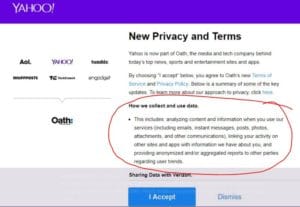Yesterday, Yahoo shocked millions of users who could not believe their eyes when confronted with the advisory that it is transitioning to Oath, a subsidiary of telecommunications giant, Verizon. Although the acquisition was announced two years ago, the abrupt change, close at the heels of the Facebook data breach scandal was considered ill-timed by most netizens, including myself. Here we are, reeling from thoughts of our privacy being compromised to then being practically forced to read the fine print on the consequences of getting to your email. We had gotten so used to “trial or beta versions” of Skype, Yahoo Mail and others that allowed users to test drive the new version prior to committing. This time, if you don’t “agree” you won’t be able to read your Yahoo email – feeling like a hostage with an “I’ll do this later” button that freezes leaves a bad taste in the mouth.
We cringe at mail getting derailed or losing contacts and cross our fingers that the changes will be for the better and not the death knell of the once-happy giant. With hordes migrating to other social media, one can’t help but think, of “what ifs” – if Yahoo 360, Blog and Video were not discontinued, we would have a viable option in case we were upset enough to delete our Facebook account. Then again, it may not be the most secure option as it was hacked in 2014; a cyber attack so massive that it affected over 500M users worldwide. Before we move on to its merger with AOL (the search leader before the rise of Google) to become Oath, here’s a brief review of Yahoo:
 Purchased at only 4.8B or roughly 10% of the original Microsoft offer, Yahoo is in bed with once rival AOL. Last year, Tim Armstrong, CEO of AOL tweeted about the merged company’s strength and predicted competitive advantage. Followers disparaged the choice of Oath as the brand name of the union. The recent volatile reaction to Yahoo’s apparent email-hostaging does not augur well for the future of Oath. It seems as if it wasn’t a marriage made in Internet heaven, after all.
Purchased at only 4.8B or roughly 10% of the original Microsoft offer, Yahoo is in bed with once rival AOL. Last year, Tim Armstrong, CEO of AOL tweeted about the merged company’s strength and predicted competitive advantage. Followers disparaged the choice of Oath as the brand name of the union. The recent volatile reaction to Yahoo’s apparent email-hostaging does not augur well for the future of Oath. It seems as if it wasn’t a marriage made in Internet heaven, after all.
“Oath strives to create a passionate and engaged community of users by building content and products that inspire and entertain the world.”
Even with its advantages for branding and having prestigious names like Huffington Post and TechCrunch as part of the family, there is a universal aversion to the security clause that implicitly tells you that to continue using your Yahoo mail, you must allow access to private information, location, interests, and media and allow Oath to link it to their other subsidiary accounts “to integrate and improve our services, and to provide more customised advertising & content, as well as for other analytics purposes”.
In short, consensual hacking that is made sadder for those who’ve had their very first email account in 1998. Even with its numerous statements about protecting privacy, it does boil down to “take it or leave it”. Allow it to scan your mail for targetted advertising or it politely gives you instructions on how to delete your account should you not allow sharing of information with Oath and the Verizon family.












 “Oath strives to create a passionate and engaged community of users by building content and products that inspire and entertain the world.”
“Oath strives to create a passionate and engaged community of users by building content and products that inspire and entertain the world.”


